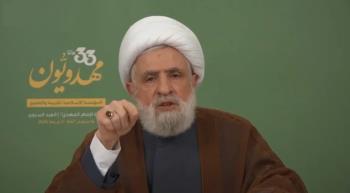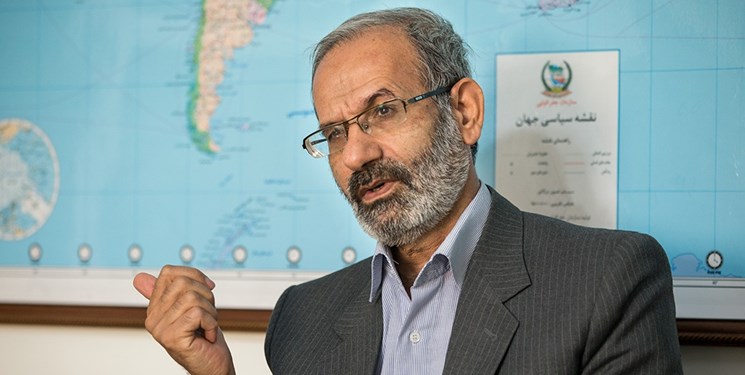Alwaght- The Israeli attack on the Iranian consulate in Damascus that led to martyrdom of a number of diplomats and IRGC commanders has massivey hit the news headlines.
Given the importance of the issue, Andisheh Sazan-e-Nour Institute for Strategic Studies held a meeting to analyze aspects of this aggression. In the meeting, held with the presence of media outlets, the senior West Asia affairs expert Saadullah Zaree brought to the spotlight the motivations and and consequences of the attack.
Expanding the assassination range in Syria
Mr Zaree said that the consulate attack was not a surprise, adding that Tel Aviv has laid plans for assassinations since the Israeli regime assassinated Sayyed Razi Mousavi, an IRGC commander, in Syria later in December.
In order to get out of the security abyss, the Israelis pursued assassination operations in Syria and Lebanon. There were obstacles in Lebanon and therefore the assassination operations were limited to a few people, but in Syria they had a wider range because they had a more open hand in Syria. The position of Hezbollah in Lebanon is different from the Syrian government in the reactions and therefore the Israelis have used this difference in reactions to pursue an assassination line.
Mr Zaree went on saying that the Israeli regime tried to expand the assassination. In Syria over the past week, the Israelis did two important actions. First; There was a heavy military airstrike on Aleppo where Hezbollah-affiliated groups were attacked and seven Hezbollah forces were martyred. Second, a few days later, the Iranian consulate in Damascus was attacked, in which 13 people, seven of whom were Iranian, were martyred.
Israel's fragile deterrence against Axis of Resistance
Asked why these attacks are being conducted now and if there is a relation between the situation we are in and the Israeli actions, Mr Zaree said that in order to answer this question, we need to see what happened over the past two weeks that Israel has taken such a high risk to act against Hezbollah and Iran.
A couple of important developments can be referred to, he said. First, despite the fact that the Israeli military had earlier said that it fully siezed control of northern Gaza, it had severely stuck in Gaza, and Hamas resistance move launched 70 operations against the occupation forces within a week.
According to Mr Zaree, a significant number of Israelis, indeed, were killed. Additionally, resistance operations from south and north of Gaza against Ashkelon and Ashdod port cities continued for six months. The resistance operations spread fear among the Israeli, showing that the Israeli army has practically no control over Gaza, neither in the north nor in the south. It also showed that the capture of a point does not mean gaining control over the whole. The resistance has maintained its dominance, and although areas from the north, south and center have been captured by the Israelis, Israel's deterrence against the Palestinian resistance is fragile.
Failure of power transition project in Gaza
Continuing his comments , Mr Zaree talked about a behind-the-scenes Israeli-Arab-Palestinian Authority plan.
According to Mr Zaree, Israel, in association with some Arab countries, sent a team of eight people to Gaza through Egypt with an aid convoy. The group was tasked with testing the ways of transition of power from Hamas to Israeli puppet administration. One of Israeli plans was that Gaza rule should be taken from Hamas and handed over to a faction approved of by Tel Aviv. The team, however, was captured after entering into Gaza. Hamas said that it will neutralize any force entering Gaza with such purpose.
Western message to the Israelis: Time's up
The West Asian affairs expert added that the fact that Hamas intelligence is still this powerful that can capture the Israeli pawns soon after their entry means that resistance had not taken serious damage publicly and politically and this represented another failure for Israel since Israeli Defense Minister Yoav Gallant had earlier said that after six months, they can seize Gaza from Hamas.
A third issue, he maintained, is the United Nations Security Council passing a resolution against Israel. Regardless of the enforcement mechanisms for the resolution, which are very weak and Israel made it clear it will not commit to, the very adoption of the resolution and the Western decline to veto sends a message to Tel Aviv: The Westerners think the time of war is up. He added that there is no more opportunity for Gallant and war cabinet to continue the war, though the West meanly continues its military support for the Israelis. Even if war ends, the Western military supplies will go on. But the fact that the once-closed UNSC door was opened to Gaza people means that Israel no longer enjoys its past leeway and privileges and it should rely on its own diplomatically.
West and Israel's failure in Paris talks
Mr Zaree said the the fourth development is related to second round of Paris talks. He held that the US, Israel, Qatar and Egypt have been holding talks since January. The visits to Paris continued until the past two weeks. The Palestinian resistance were pessimistic to the negotiations as they were certain that they were aimed at helping Tel Aviv realize its war objectives. The Israelis hoped that the quadruple committee will force the Palestinian resistance to accept somethint not in its interest. The core point of Hamas talks was disarmament of Hamas. But if Hamas lays down its weapons, there would be no resistance. Therefore, disarming the resistance essentially meant to end the resistance. Here Hamas set four conditions. First, full stop of war, second, return of the displaced northerners to their homes, third, removal of Israeli military equipment and forces from Gaza, and four, lifting the blockade on the enclave to pave the way for its reconstruction. These conditions of the resistance were humiliating and infuriating to the Israeli regime because normally a party sets conditions that has an upper hand and is in a position of power.
Hamas stood on its stance to an extent that the four-party committee could not advance the talks against its interests, despite the fact that the Americans vetoed UN Security Council resolutions to give Israel a leeway to continue its massacres. They relied on Paris talks. The United States envoy argued that a resolution will hamper the negotiations. In other words, Washington believed that it could conclude the case of Hamas disarmament through Paris talks. But it failed, and the Israeli had to accept defeat in Paris talks. This was another political development showing that political doors are closed to Israel.
Important message of reception of resistance leaders in Tehran
According to the analyst, another important development was that shortly after the UNSC resolution, Hamas and Islamic Jihad officials arrived in Tehran and were given a formal reception by Iranian Foreign Minister Hossein Amir-Abdollahian as an official. Red carpets were rolled out, and the Palestinian leaders were received not just by a foreign minister but a representative of the the state in Iran.
This expert continued that meeting with the Supreme Leader of Iran Sayyed Ali Khamenei is usually a meeting that takes place at the level of presidents and prime ministers. Ismail Haniyeh, however, met the leader for the second time since the start of the war, and Ziyad al-Nakhalah met him, too. And then there was a meeting with the president and the Chief of the General Staff of the Armed Forces, namely the highest military and political officials of Iran. They also held long talks with the foreign minister. This meant that resistance believed that war has ended, Israeli lost, and it won, and the ongoing war is just because of stubbornness of a losing side. This fifth development caused huge horror to the Israeli regime.
Mr Zaree said that the sixth development took place in the occupied territories. He maintained that large-scale demonstrations were held across the Israeli regime led by the families of the prisoners. There were reports of tens of thousands of demonstrators in Tel Aviv streets. Tens of thousands was much more than the families of the prisoners. These protests were backed by opposition. They have taken place while some of the opposition parties are members of the war cabinet, namley they have role in war and at the same time support demonstrations. Lapid, Bennet, Gantz, and Eisenkot supported the protests.
In other words, Mr Zaree noted, the opposition unleashed a heavy wave of protests against Netanyahu at home by taking the defeats on the battleground as an excuse. This development is bitter and breaking for Tel Aviv, and when all these factors are put together, a terrifying atmosphere engulfs Israel. To shift this atmosphere, they chose the option of attacking Iranian forces in Syria.
The expert went on that the Israeli attacks in Syria over the past 10 days against Hezbollah and Iran were mainly carried out with the aim of restoring deterrence. They believe that restoring deterrence is the key to survival and so it is worth taking the risk of attacking Iran and Hezbollah in Syria.
Iran's strategic reaction to Israeli attacks
In his final words, Mr Zaree commented on the way of Iranian reactions to these Israeli actions, saying there are two issues here. Iran needs to ask what it should do in reaction to such hostility. Iran has two options that it needs to think about. First, it should think about ending Gaza war. This has been the key strategy of the Islamic Republic since the beginning of war. Actually, Israeli war on Gaza on October 8 and Hamas’s Operation Al-Aqsa Storm are two different things.
The Iranian policy revolves around stopping the war. Sayyed Hassan Nasrallah of Hezbollah said two months ago in his speech that this war should end with Israel's defeat. This is the essential strategy the Resistance camp is following and this is a top issue.
Mr Zaree maintained that he thinks that this Israeli loss has happened, but Tel Aviv has not yet admitted it, and the Resistance camp should force the Israeli to admit it. He added that the talk about Israeli loss is not just the talk of the Resistance camp. Israelis themselves, the US, Europe, and Russia all have said that Tel Aviv has not made gains in this war and this means defeat. When a party attacks and sets goals, and these goals are not realized, all take it a loss.
Mr Zaree concluded that if the final stage of war ends with Israeli admission of defeat, actually the Axis of Resistance would have responded to blood of tens of thousands of innocent Palestinian civilians and Hezbollah martyrs.
A certain Israeli defeat would mean ushering in collapse in a short period. This is what the Israelis acknowledge. Gallant told Fox News that if Tel Aviv loses the war, Israel will not survive in the current geography. He said the same thing in his meeting with Biden. He told the American president that Israeli loss will mean loss of all of the governments reliant on the US in the region. Especially, the West will be removed from West Asia region. So, if the Resistance camp manages the final stage of Gaza war in a way in which Israel withdraws from Gaza a loser, Israel's collapse will begin. The second issue is taking revenge for the blood of Iranian martyrs as well as Lebanese martyrs. Iran cannot back down and will certainly avenge blood of martyrs as the leader pleaged.



























